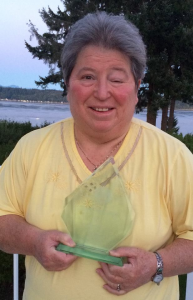Posted
Categories: My Experience
It’s National Volunteer Week, and we’re putting the spotlight on some of our incredible patient partners! In this blog piece, patient partner Jean Shepherd discusses how she got involved with PVN and what motivates her to keep using her voice.
A few years back, I looked in the mirror and decided that this salt and pepper hair needed something – and dyeing it purple wasn’t an option! I needed a challenge. Then I heard about the Patient Voices Network and thought, “BINGO! This fits!”

Having acquired a disability several years ago, I had multiple experiences with health care, and saw room for improvement. It was time for the new challenge: diplomatically giving the patient side of health care, and encouraging providers to use language that patients could understand!
One morning I found myself sitting in a room with about 20 other people listening to the ins and outs of how to be a patient voice. After about six hours of exploration and lunch, I felt ready to use my voice as a patient partner.
My very first adventure took me to Victoria for an all-expense paid day of work. The challenge? A group of four patient partners were going to re-write three booklets about the preparation for surgery, what happens in the hospital for surgery and going home after surgery. Most importantly, we were going to rewrite the booklets in “patientese” – the language that every day patients use! After three or four teleconferences, our group had produced three booklets for distribution in the Island Health network. The work was fun and challenging. It demanded critical listening and diplomatic exchanges about the materials to produce an end result we were all happy with.
After the booklets were produced, the health care staff member in charge of the project sent us copies of the finished product with a thank you note. It was a very memorable first engagement opportunity!
Of course, there are also challenges as a patient partner. Along with another PVN member, I attended a nursing centre in my home community for a couple of hours every two weeks for over a year. Our community long-term care staff had been tasked with exploring new ways of delivering home care to its seniors. This project was interesting and provided a challenge in diplomacy. I had heard people talking about “siloes” and “siloization” – and even a verb form: “siloed.” When you try to make changes in a field of siloes, you discover it can take a great deal of diplomacy. While the issues we were trying to tackle were formidable, during this project, I was able to grow and hone my teaching and learning skills. We did a lot of work and eventually were able to accomplish some significant changes!
I am really enjoying my current engagement project because it is all about explaining heart procedures in “patientese” and creating a website that answers patient questions in patient-friendly language. Funding for the project is focused on using patient-friendly language and I am helping write proposals and letters of support. It’s very exciting work!
These are just a few of the many projects I’ve been involved with as a patient partner. Things are changing in Health Care and patients are needed to give input on how to make the changes. We need men and women of all ages because we all have been patients and can give diplomatic suggestions for change.
I have high hopes for the future for the Patient Voices Network. While we have seen more and more health-related forums accept and consider the opinions of patients, I hope that in coming years the patient perspective will help to inform and inspire meaningful changes throughout the health care system.
Author: Jean Shepherd


